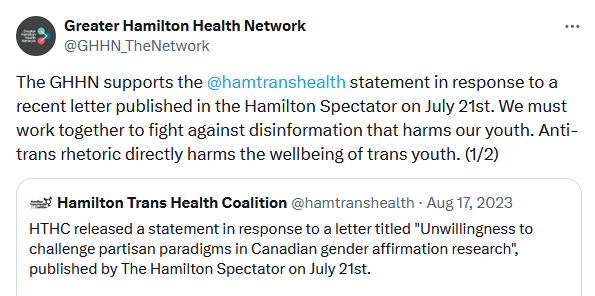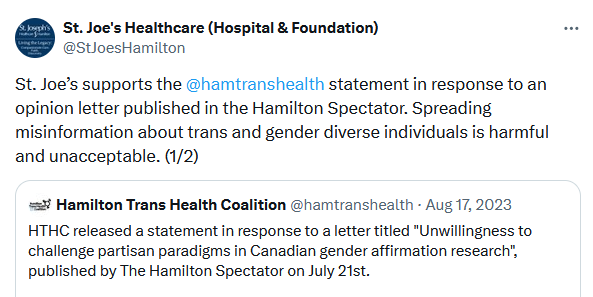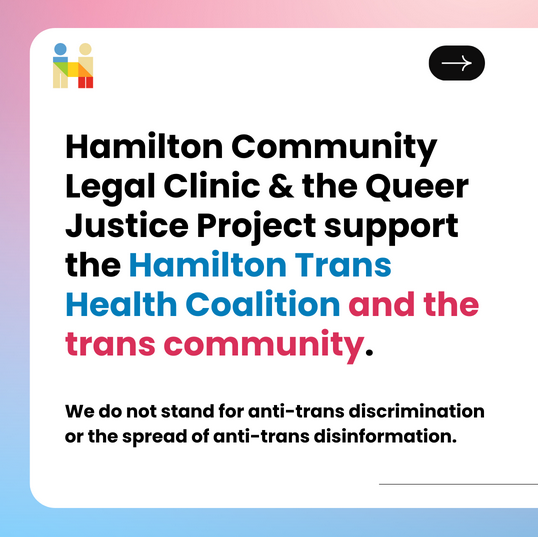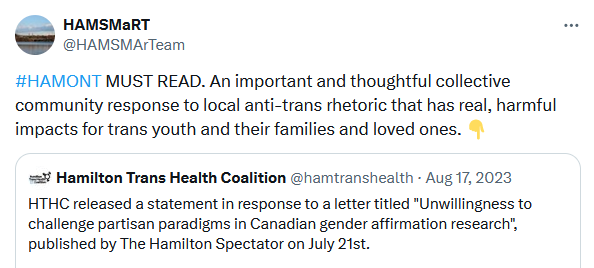On July 21st The Hamilton Spectator published the letter Unwillingness to challenge partisan paradigms in Canadian gender affirmation research. It is a clear example of the rhetoric and tactics that modern anti-trans movements use to dehumanize trans people and strip them of human rights.
In the face of organized anti-trans actors targeting the gender affirmation of all trans youth, it is critical to learn to recognize and call out anti-trans narratives. The July 21st letter is anti-trans disinformation. It attempts to delegitimize the most basic, fundamental practices for supporting trans youth under the guise of concern and debate. This is harmful to trans youth and to the wider Hamilton trans community. This kind of disinformation has permeated mainstream Canadian media and we are saddened to see direct local impacts.
Why respond?
We do not want to legitimize the intellectually dishonest talking points in the original letter by engaging in debate with a piece that so clearly manipulates basic information about trans youth and gender affirmation. Instead, we will turn this into a learning opportunity for everyone who wants to build a safer world for gender diverse youth.
This statement shows how anti-trans disinformation is presented as legitimate or evidence-based, to slowly create doubts and questions about trans people. Those who promote anti-trans disinformation rely on their audience accepting what they claim without critical analysis or fact-checking. This is harmful to gender diverse people, the people who love them, their healthcare providers, and the very disciplines of science and medicine.
The letter blatantly misrepresents the data in the single study it references to imply that access to gender-affirming care causes suicidality in trans youth. This assertion is false, as evidenced below. The letter uses this argument to fearmonger about the existence of trans youth and social and medical transition.
The Spectator presents the central argument of the letter with this summary: “the claim that children have fewer negative outcomes following gender affirmation is simply untrue”. Children do have fewer negative outcomes following gender affirmation, this is widely evidenced in the research. To attempt to subvert this fact, the letter cites Psychosocial Functioning in Transgender Youth after 2 Years of Hormones (2023) in the New England Journal of Medicine (NEJM). A review of the article shows that the research supports no such claim. This is a study that analyzed the psychosocial functioning of youth (12-20 years old) after two years of gender-affirming hormone therapy. The conclusion of the study, in its entirety, was “In this 2-year study involving transgender and nonbinary youth, GAH [gender-affirming hormones] improved appearance congruence and psychosocial functioning”. This study does not analyze the impact of social transition or gender affirmation as a whole and is patently unsuitable as evidence for any such general assertion of the effect of gender affirmation.
What does the evidence say?
The reality is that many studies have examined different components of gender affirmation, social transition and the mental health of trans youth. In these studies, acceptance of gender and access to social transition correlate with improved mental health for trans youth. These include:
This study analyzed the association between gender identity acceptance and suicide attempts with 8218 trans and non-binary youth.
It found that each category of acceptance was associated with a lower odd of past-year suicide attempt. The strongest association with lowered odds was between acceptance from parents and other family members.
The authors conclude “Interventions aimed at suicide prevention for [trans and non-binary] youth should include efforts aimed at leveraging gender identity acceptance from supportive adults and peers in their lives”.
Read the study at https://www.liebertpub.com/doi/10.1089/trgh.2021.0079
This study compared the mental health of trans children (aged 3-12) who had socially transitioned with control groups of cisgender (non-trans) children.
It found that trans children who had the support and affirmation to socially transition showed no elevations in depression and only slightly elevated anxiety, noting “socially transitioned transgender children who are supported in their gender identity have developmentally normative levels of depression and only minimal elevations in anxiety”.
This demonstrates that the high levels of depression, anxiety, and suicidality found in older trans youth populations is not inevitable; early gender affirmation for youth who express a trans identity can improve overall mental health.
Read the study at https://publications.aap.org/pediatrics/article-abstract/137/3/e20153223/81409/Mental-Health-of-Transgender-Children-Who-Are
This study reviewed 15 studies published between 2011 and 2016 that analyzed the mental health of trans youth.
They found “significant data have emerged related to improved mental health outcomes after gender-affirming medical therapy and supported social transition in childhood”.
Read the study at https://www.jahonline.org/article/S1054-139X(16)30146-X/fulltext
This study analyzed the survey results of 74 trans youth ages 15-21 who reported using a different name than the name given to them at birth. The survey asked questions relating to suicidal ideation and behaviour, as well as whether they used their chosen name in four different contexts (home, school, work, friends).
The study found that chosen name use in more contexts predicted decreased suicidal ideation and suicidal behaviour. Specifically, increasing one context where a trans youth could use their chosen name predicted a 29% decrease in suicidal ideation and a 56% decrease in suicidal behaviour.
When youth used their chosen name in all four contexts, suicidal ideation and behaviour were lowest.
Read the study at https://www.jahonline.org/article/S1054-139X(18)30085-5/fulltext
This study analyzed the results of the Trans PULSE Ontario survey for the 84 trans youth (aged 16-24) who indicated that they had socially transitioned and come out to their parents.
They found that youth who had parents who were supportive reported higher self-esteem, were more satisfied with life, and self-rated their physical health better than youth who had parents who were somewhat to not at all supportive.
23% of youth with supportive parents reported depressive symptoms, whereas 75% of youth with parents who were strongly not supportive reported depressive symptoms. They also found a 93% reduction in reported suicide attempts for youth with strongly supportive parents compared to youth with strongly not supportive parents.
Read the study at https://transpulseproject.ca/wp-content/uploads/2012/10/Impacts-of-Strong-Parental-Support-for-Trans-Youth-vFINAL.pdf
Using a study about the impact of medical transition to fearmonger about all affirmation of trans youth is not the only issue with the single citation in the letter. The letter cherry-picks results from the NEJM study to make an obviously unsubstantiated claim. The letter reads:
A paper published in the New England Journal of Medicine in January of this year disclosed that of 312 children given gender-affirming care in a multi-centre study in the US, there were two suicides within the first 18 months of the start of medications. Suicide in children, regardless of mental health diagnoses or gender non-conformity, is extremely rare. In any other area of medicine, such a negative outcome in a medical intervention would have led to a suspension of the study.” (Emphasis added.)
Using the loaded term “disclosed” implies providing information that was previously hidden or unknown. The NEJM study authors make no secret that two youth in their sample died by suicide; they state it clearly at the beginning of their article. Additionally, the study does not present data or speculate about the cause of either suicide or suicidal ideation in their sample population. The letter provides no evidence for its unsupported claim that access to gender-affirming hormone therapy caused suicide.
The letter conveniently leaves out the very findings of the NEJM study:
During the study period, appearance congruence, positive affect, and life satisfaction increased, and depression and anxiety symptoms decreased. Increases in appearance congruence were associated with concurrent increases in positive affect and life satisfaction and decreases in depression and anxiety symptoms.
The study also finds:
Youth who had initiated GAH [gender-affirming hormones] in early puberty had higher scores for appearance congruence, positive affect, and life satisfaction at baseline and lower scores for depression and anxiety at baseline than those who had initiated GAH in later puberty.
In other words, access to gender-affirming hormone therapy showed tangible benefits to trans youth in the study.
The letter dismisses essential context about suicidality and trans communities. The NEJM study found suicidal ideation in 11 youth or 3.5% of their sample. Neither the NEJM study nor the letter address the evidence that trans youth typically experience disproportionately high rates of suicidal ideation and suicide attempts for reasons that include minority stress, lack of affirmation and affirming care, experiences of discrimination, and the distress associated with experiencing gender dysphoria. Trans Pulse Canada (2019), Clark et al. (2014), and Perez-Brumer (2017) all found higher rates of suicidality than the youth in the NEJM study who had access to gender-affirming hormone therapy.
This project surveyed 991 trans youth in Canada and found that 40% had considered suicide in the past year and 9% had attempted suicide.
Read about the study at https://transpulsecanada.ca/results/report-health-and-well-being-among-trans-and-non-binary-youth/
This study found that 1 in 5 trans youth surveyed had attempted suicide.
Read the study at https://www.jahonline.org/article/S1054-139X(13)00753-2/fulltext
This study found found that 33.73% of trans youth surveyed reported suicidal ideation in the past 12 months.
Read the study at https://pubmed.ncbi.nlm.nih.gov/28838578/
Furthermore, studies have consistently demonstrated correlations between access to requested medical transition care and improvements in mental health and well-being for trans youth. These include:
A study of 104 trans and non-binary youth (aged 13-20), where approximately two thirds of participants received medical transition and one third did not.
The study found “60% lower odds of moderate or severe depression and 73% lower odds of suicidality over a 12-month follow-up” for the youth who accessed medical transition.
Read the study at https://jamanetwork.com/journals/jamanetworkopen/fullarticle/2789423
This study examined associations between access to gender-affirming hormone therapy and mental health through survey data that included 11,914 trans and non-binary youth (aged 13-24).
The study found that access to gender-affirming hormone therapy was associated with lower odds of recent depression and seriously considering suicide when compared to those who wanted to access hormones but could not access them.
Additionally, for youth aged 13-17, gender-affirming hormone therapy was also associated with lower odds of recent depression and lower odds of a past year suicide attempt.
Read the study at https://www.jahonline.org/article/S1054-139X(21)00568-1/fulltext
This study used data from the 21,598 participants in the 2015 U.S. Trans Survey who indicated ever desiring access to gender-affirming hormones.
The study examined associations between access to gender-affirming hormones during adolescence (age 14–17) or adulthood (age 18+) and adult mental health outcomes, with participants who desired but never accessed hormones as the reference group.
They found that access to hormones during adolescence was associated with lower odds of past year suicidal ideation.
Read the study at https://journals.plos.org/plosone/article?id=10.1371/journal.pone.0261039
This study analyzed data from the 3494 individuals in the 2015 U.S. Trans Survey who ever wanted pubertal suppression as part of their gender-affirming medical care.
It found those who accessed pubertal suppression had lower odds of lifetime suicidal ideation compared to those who had wanted pubertal suppression but did not receive it.
Read the study at https://publications.aap.org/pediatrics/article/145/2/e20191725/68259/Pubertal-Suppression-for-Transgender-Youth-and
This study used the results from a survey of 608 trans youth (aged 14-26) in New Zealand to examine the mental health differences between trans youth reporting an unmet need of gender-affirming care and trans youth who had access desired gender-affirming care.
They found “overall unmet need for gender-affirming care was associated with worse mental health”, noting that participants reporting unmet need for hormones had had twice the odds of having attempted suicide in the last 12 months.
Read the study at https://www.ncbi.nlm.nih.gov/pmc/articles/PMC10273389/
Major medical organizations in the US and Canada have published statements in support of trans youth and gender-affirming care. In Canada these include the Canadian Paediatric Society, Canadian Association of Social Work Education & Canadian Association of Social Workers, Children’s Healthcare Canada (with a quote from the President of McMaster Children’s Hospital), and the Greater Hamilton Health Network. In the US, this includes the American Academy of Pediatrics, American Medical Association, Endocrine Society & Pediatric Endocrine Society, and American Psychiatric Association.
An affirming approach to caring for transgender and gender-diverse youth
June 20, 2023
excerpts:
“TGD youth are at elevated risk for adverse health outcomes, including depression, anxiety, eating disorders, self-harm, and suicide. This elevated risk is thought, in part, to be attributable to ‘minority stress’, defined as the “distinct, chronic stressors minorities experience related to their stigmatized identities, including victimization, prejudice, and discrimination”. Consistent with this theory, Canadian TGD youth report high levels of exposure to harassment and violence. Risk may be mitigated by affirming experiences and environments, such as supportive parents, early social transition for those who express this desire, and inclusive and non-judgmental interactions with the health care system.”
“Recommendations
- Health care providers (HCPs) should adopt an affirming approach to care for all children and youth, including those who are transgender or gender-diverse (TGD).
- Gender-affirming care must be upheld as standard of care for TGD youth.”
Joint Statement on the Affirmation of Gender Diverse Children and Youth
excerpts:
“Gender diverse young people are to be affirmed as the gender they understand themselves to be, as consistent with Values 1 and 2 of the CASW Code of Ethics (1. Respect for the inherent dignity and worth of persons, and 2. Pursuit of social justice), and consistent with Principle 9 of the CASWE-ACFTS Standards for Accreditation (Standards encourage and support diversity and social justice in all aspects/domains of social work programs).”
“Gender identity is a core aspect of the self. Any professional’s attempt to alter the gender identity or expression of a young person to align with social norms is considered unethical and an abuse of power and authority.”
Gender-affirming care is an essential health service for transgender children and youth
February 25, 2022
excepts:
“Children and youth in Canada have the right to access high quality, comprehensive, and evidence-based care — transgender and gender-diverse youth are no exception.”
“On behalf of Children’s Healthcare Canada, I want to express our continued support for transgender and gender-diverse children, youth, and their families. Nobody should face discrimination or hostility because of who they are. We want kids and families to know that we are with you, we care about you, and we are here to care for you.”
— Bruce Squires, Board Chair, Children’s Healthcare Canada and President, McMaster Children’s Hospital
GHHN Gender-Affirming Care Position Statement
April 2023
excerpt:
“In a global environment where gender-affirming care has been politicized to justify restricting or limiting access, we stand in support of our local Two-Spirit, transgender, non-binary, and gender-diverse communities. Providing gender-affirming care confirms bodily autonomy to those we serve and is consistent with our Health Equity framework.”
Ensuring Comprehensive Care and Support for Transgender and Gender-Diverse Children and Adolescents
October 1, 2018
excerpts:
“Youth who identify as TGD often confront stigma and discrimination, which contribute to feelings of rejection and isolation that can adversely affect physical and emotional well-being. For example, many youth believe that they must hide their gender identity and expression to avoid bullying, harassment, or victimization. Youth who identify as TGD experience disproportionately high rates of homelessness, physical violence (at home and in the community), substance abuse, and high-risk sexual behaviors.”
“[T]ransgender identities and diverse gender expressions do not constitute a mental disorder;
variations in gender identity and expression are normal aspects of human diversity, and binary definitions of gender do not always reflect emerging gender identities;
gender identity evolves as an interplay of biology, development, socialization, and culture; and
if a mental health issue exists, it most often stems from stigma and negative experiences rather than being intrinsic to the child.”
AMA reinforces opposition to restrictions on transgender medical care
Jun 15, 2021
excerpts:
“Gender-affirming care is medically-necessary, evidence-based care that improves the physical and mental health of transgender and gender-diverse people.”
“AMA will continue to work to ensure transgender and gender-diverse minors have the opportunity to explore their gender identity under the safe and supportive care of a physician.”
Transgender Health: An Endocrine Society Position Statement
December 16, 2020
excerpt:
“Over the last decade, there has been considerable research on and development of evidence-based standards of care that have proven to be both safe and efficacious for the treatment of gender dysphoria/gender incongruence in youth and adults. There is also a growing understanding of the positive impact that increased access to such treatments can have on the mental health of these individuals.”
Position Statement on Access to Care for Transgender and Gender Diverse Individuals
July 2018
excerpt:
“Significant and long-standing medical and psychiatric literature exists that demonstrates clear benefits of medical and surgical interventions to assist gender diverse individuals seeking transition.”
What can I do?
Two common anti-trans disinformation tactics targeting youth are employed in the letter. Parents, health-care providers, allies, and everyone invested in bodily autonomy should be able to recognize these tactics.
The first tactic is claiming that something happening elsewhere in the world is evidence for why access should be restricted here in Canada. This is often framed as, ‘[European country] has banned gender-affirming care for youth after listening to the latest evidence, therefore we should too’. This is generally a misrepresentation of what is happening in different countries, often taking advantage of a language barrier. It intentionally downplays the active anti-trans movement in the named countries to imply that any restriction on care access is ‘evidence-based’ and not tied to an anti-trans political movement. For more information on this tactic, check out Alex Koren’s article The GOP’s War on Trans Kids Relies on Myths about a “Progressive” Europe (2023).
The second tactic is to call the evidence for gender-affirming care ‘low quality’. Evidence demonstrating that gender affirmation and gender-affirming care improves outcomes for trans youth is dismissed through this label without engaging honestly with the complexities of human-focused research. This, again, takes something that is true and completely misrepresents the context underpinning it to push an agenda against trans youth.
A majority of the extensive evidence in support of affirmation and gender-affirming care for youth and adults alike receives a ‘low quality’ label under the Grading of Recommendations, Assessment, Development and Evaluations (GRADE) framework for evaluating scientific evidence. Under this framework, the primary type of study that can receive a ‘high quality’ rating is a randomized controlled trial (RCT). In an RCT, participants are divided into a control group and a treatment group. The control group receives no treatment and is compared against the group that did receive treatment. This type of study is highly unethical for gender-affirming care; it would require denying medical care to trans youth for the purposes of a control group. RCTs also use blinding or masking, where participants do not know which group they have been randomized into, to mitigate potential bias. However, physical changes to the body are a primary goal of medical transition (either the pausing of puberty or the onset of secondary sex characteristics), and the mental health benefit of medical transition hinges on these changes. This makes it impossible to mask who receives medical transition between a control and treatment group; all participants would figure out if they had been given the medical care they needed.
Interest groups peddling anti-trans disinformation rely on the ‘low quality’ technical label and a lay misunderstanding of research ethics to delegitimize the evidence for a type of healthcare they want to restrict and eliminate. It’s actually common and necessary for medical guidelines, especially in pediatric medicine, to be based on evidence that GRADE rates as ‘low quality’. For more information on gender-affirming care, RCTs, GRADE, and evidence-based medicine, check out Florence Ashley’s Randomized-controlled trials are methodologically inappropriate in adolescent transgender healthcare (2023).
Successful disinformation campaigns present an avalanche of half-truths and manipulations at once, to overwhelm readers and the impacted community, while constantly moving the goal posts. Attacks against trans youth are increasing in the media. Everyone can and should learn to apply critical analysis to these narratives.
#HamiltonForAll
It is egregious that this letter used the very real issue of suicidal ideation in the trans youth community and the deaths of two trans youth by suicide to fearmonger about the very healthcare that decreases suicidality for trans youth. We are appalled that this was published.
Trans youth are real. They know their genders and identities. Social affirmation and medical transition, when requested, are solidly evidence-based methods of ensuring their best health outcomes. There will always be letter writers, academics, providers, and media personalities that find personal value in pushing anti-trans disinformation to fearmonger about our community’s youth and healthcare. We will continue fighting for a world where all gender diverse people can live their lives freely, on their own terms.
Hamilton Trans Health Coalition
Endorsements and public support for this statement

Greater Hamilton Health Network
"The GHHN supports the @hamtranshealth statement in response to a recent letter published in the Hamilton Spectator on July 21st. We must work together to fight against disinformation that harms our youth. Anti-trans rhetoric directly harms the wellbeing of trans youth. ..." —@GHHN_TheNetwork

St. Joseph's Healthcare Hamilton
"St. Joe’s supports the @hamtranshealth statement in response to an opinion letter published in the Hamilton Spectator. Spreading misinformation about trans and gender diverse individuals is harmful and unacceptable. ..." —@StJoesHamilton

Hamilton Community Legal Clinic
"Trans youth are real. They know their genders and identities. Social affirmation and medical transition, when requested, are solidly evidence-based methods of ensuring their best health outcomes. Access to evidence-based healthcare is a matter of access to justice." —HCLC Statement

The Hamilton Social Medicine Response Team
"#HAMONT MUST READ. An important and thoughtful collective community response to local anti-trans rhetoric that has real, harmful impacts for trans youth and their families and loved ones." —@HAMSMArTeam